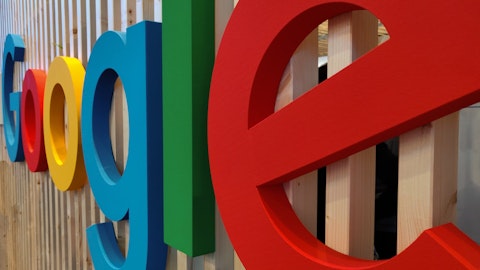3. Alphabet Inc. (NASDAQ:GOOG)
Number of Hedge Fund Holders: 156
AQR Capital’s Stake Value: $518,882,000
Alphabet Inc. (NASDAQ:GOOG) has featured on AQR Capital’s portfolio since the third quarter of 2015, and the fund sold off its stake in Q2 2017, only to buy it back in the next quarter. In Q3 2022, AQR boosted its Alphabet Inc. (NASDAQ:GOOG) stake by a whopping 1786%. The fund owns 5.4 million shares of the company worth $518.8 million, representing 1.26% of the total 13F securities.
On November 15, activist investor Chris Hohn of TCI Fund Management urged Alphabet Inc. (NASDAQ:GOOG) to control costs and reduce its employee count, citing a “strong conviction” in Alphabet’s future. Hohn specified that the management needs to publicly announce a target for earnings before interest/taxes margin, “substantially” lower losses in its long-term “Other Bets” segment, and increase share repurchases.
Morgan Stanley analyst Brian Nowak on November 15 reiterated an Overweight rating on Alphabet Inc. (NASDAQ:GOOG) but trimmed the firm’s price target on the shares to $120 from $125, citing a weakening ad market which continued to grow through Q3 earnings season.
According to Insider Monkey’s Q3 data, 156 hedge funds were long Alphabet Inc. (NASDAQ:GOOG), compared to 153 funds in the last quarter. Chris Hohn’s TCI Fund Management is the largest stakeholder of the company, with 52.4 million shares worth over $5 billion.
Here is what Mayar Capital has to say about Alphabet Inc. (NASDAQ:GOOG) in its Q3 2022 investor letter:
“In early January this year – which admittedly feels like eons ago – US President Joe Biden was pushing Americans to take up the government’s offer of free COVID tests to help tackle the surging omicron variant. How did Biden respond when citizens asked about the availability of these tests?
“Google it!”
This advice, undoubtedly well-meant, was roundly scoffed at by the press, however. It seemed too obvious to be very helpful.
Anyway, the anecdote serves to introduce you to one of our largest holdings, Alphabet; the parent company of Google. Note that first, Alphabet’s original and core product – its search engine – has entered our common vocabulary as a verb. ‘Googling’ something has the same meaning as ‘researching’ or ‘finding an answer to’ something. Second, the reason Biden’s advice was met with such opprobrium was because Googling something has become almost second nature to us now.
These two observations reveal a lot about Google’s strength in the search engine market, in which it has a share of over 90 percent. Because internet search is almost the prototypical network, Google has benefitted from – and we think is also protected by – the huge competitive advantage its scale brings – both to those asking the questions and those providing the answers. The Google search platform becomes increasingly useful to anyone seeking information as a greater volume of stuff becomes available. This starts a virtuous cycle that results in a colossal market share for Google itself. In the language of business strategists, Google benefits from vast network effects.
Because Google’s search results are viewed by billions of eyeballs every day, its search page ‘real estate’ is understandably very valuable to those with goods and services to sell. Advertising revenues from this ‘real estate’ as well as that from its other properties such as Mail, Maps, and so on, totaled almost USD 150b in 2021; amounting to almost 58% of the company’s revenues. Ad sales on YouTube, also owned by Alphabet, brought in another USD 28b. With the secular shift of the advertising spend to digital channels – over which Alphabet has a tight grip – we estimate the company has a share of around 40% of the digital advertising market and is probably the most valuable advertising property in the world…” (Click here to see the full text)
Follow Alphabet Inc. (NASDAQ:GOOGL)
Follow Alphabet Inc. (NASDAQ:GOOGL)
Receive real-time insider trading and news alerts





